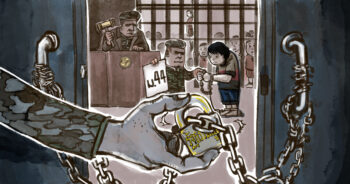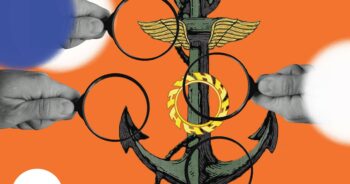On 16 July 2019, the new cabinet after the first general election under the 2017 Constitution of the Kingdom of Thailand was sworn and triggered the cessation of powers and duties of the National Council for Peace and Order (NCPO) which ruled the country since 22 May 2014. Nonetheless, throughout the past five years, the NCPO has left the country’s rule of law and jurisprudence in tatters and the entire system of accountability and checks and balances in ruins. The constitution has been drafted with an ulterior motive to cement the ruling power of the NCPO and its cliques (For more information, please see Five years under NCPO, isn’t that enough? Recommendations to eliminate the effects of the coup).
Through offering legal assistance to people affected by the exercise of power by the junta and monitoring the state of human rights, the Thai Lawyers for Human Rights (TLHR) has found that there are significant remnants of the power exercised during the time of the NCPO. These remnants can be found organizationally in various state organs and independent organizations and legislatively in a number of NCPO Announcements and Orders, the Head of the NCPO Orders and laws promulgated by the National Legislative Assembly (NLA) as well as the 2017 Constitution. This is demonstrated by the following facts:
1. The NCPO Announcements and Orders, the Head of the NCPO Orders and laws promulgated by the National Legislative Assembly (NLA) will remain effective until they are amended or repealed by statutory laws.
The NCPO has issued 214 NCPO Orders, 132 NCPO Announcements and 211 Head of the NCPO Orders, for a total of 557 instruments. The National Legislative Assembly (NLA) has enacted 444 laws . The Head of the NCPO Order No. 9/2562 only repeals 70 NCPO Announcements and Orders and Head of the NCPO Orders. As a result, the other NCPO Announcements and Orders, Head of the NCPO Orders and other statutory laws enacted by the NLA will remain effective despite the cessation of power of the NCPO. In other word, they will remain applicable until they are amended or repealed by other statutory laws or administrative orders.
The many Announcements, Orders and statutory laws impact everyone. Yet, they had been decreed by a handful of people in power and subject to very minimal deliberation. Section 279 of the 2017 Constitution provides for impunity and ensures the constitutionality of all the NCPO Announcements and Orders making it impossible to keep the acts stemming from the decrees in checks through normal constitutional mechanisms.
The assessment of Thai Lawyers for Human Rights (TLHR) is that all the Announcements, Orders and statutory laws should be reviewed by the House of Representatives as a matter of urgency. Failure to do so will prolong their long-term adverse impact on Thai jurisprudence.
2. The impact on state organs and independent organizations
Aside from the NCPO Announcements and Orders and the Head of the NCPO Orders, the NCPO has played an important role in selecting persons to hold positions in state organs and the legislative body, including the 250 members of the Senate and other independent organizations such as the National Human Rights Commission (NHRC), the Office of the Ombudsman, the National Anti-Corruption Commission (NACC), the Constitutional Court, the Election Commission of Thailand (ECT), and the National Broadcasting and Telecommunications Commission (NBTC). All these mechanisms will remain in power and will support the former NCPO members who are now part of the new administration. In particular, the NCPO has broadly expanded the powers, duties and financial resources of the Internal Security Operations Command (ISOC), including its regional and provincial chapters per Head of the NCPO Order no. 51/2560. It will become a pivotally important tool to restrict people’s freedoms in various forms including through the so-called “attitude adjustment” scheme.
The assessment of TLHR is that it is an important role of the House of Representatives to review all these decrees, recruitment procedures, and the powers and duties of various state organs. Meanwhile, the public at large can help to monitor the performance of such state organs and independent organizations to ensure they carry out their duties within the bounds of law and justice, without discrimination and in a manner compatible with democracy.
3. The military still retains its power to hold civilians in custody
The Internal Security Act 2008 (ISA), which outlines the powers and duties of ISOC, ensures that part of ISOC is run by civilians and does not empower it to hold civilians in custody. However, there are other security agencies, including the military, which continue to play an important role in the aftermath of the election.
Further, “the power to hold civilians in custody for up to seven days” is still vested in the so- called Public Order Maintenance Competent Officials and the Prevention and Suppression Competent Officials per Head of the NCPO Order No. 3/2558 and Head of the NCPO Order No. 13/2559 which are still applicable and were not repealed by the last Head of the NCPO Order (For more information, please see Military authorities can still arbitrarily detain civilians: An observation in the wake of the issuance of the Head of the NCPO Orders no. 9/2562 to repeal some NCPO Announcements/Orders and Head of the NCPO Orders which are no longer necessary).
If the power to hold civilians in custody was no longer necessary, the NCPO would have designed Head of the NCPO Order No. 9/2562 to repeal Head of the NCPO Order No. 3/2558 and Head of the NCPO Order No. 13/2559 along with other repealed decrees. That the Orders remain in place blatantly indicates the military’s intent to retain the power to detain civilians.
In addition, there is redundancy in terms of personnel between ISOC and competent officials per the Head of the NCPO Orders since all involved persons are all military officials. It will result in confusion and uncertainty for the public and even other officials at the operational level. Such confusion has often arisen previously in places where the Internal Security Act and Martial Law are imposed simultaneously, including in the southern border provinces.
TLHR recommends that Head of the NCPO Order No. 3/2558 and Head of the NCPO Order No. 13/2559 be repealed immediately. When any wrongdoing or public disruption takes place, law enforcement officials can resort to powers already prescribed in the Criminal Procedure Code. It is not necessary to retain power offered by Head of the NCPO Order No. 3/2558 and Head of the NCPO Order No. 13/2559. Further, if the Public Order Maintenance Competent Officials and the Prevention and Suppression Competent Officials exercise their power per Head of the NCPO Order No. 3/2558 and Head of the NCPO Order No. 13/2559, the public can then hold them to account since the body which had bestowed power upon to them in the first place no longer exists.
Nonetheless, what has been described is just part of the remnants of the coup which will remain even after the NCPO has ceased to exist. In reality, the ruling power is still held by the same old cliques who have previously appointed persons to hold positions in various state organs and independent organizations which support them. Many draconian laws which are constitutional and offer impunity to the enforcement officials remain in place. Thai Lawyers for Human Rights (TLHR) therefore reminds the House of Representatives and the public to stay vigilant and follow the situation and help to push for legal reform to deal with such remnants and to restore a genuine democratic system and the rule of law.
Thai Lawyers for Human Rights (TLHR)




